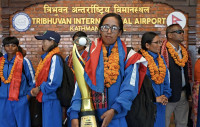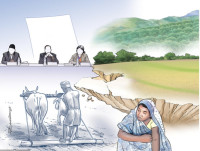Opinion
Sex and the citizen
Given the long history of migration from Nepal, there is nothing new about stories of wayward wives
Deepak Thapa
That migration is a fact of life for the bulk of Nepal’s population is by now a truism. Taking the most obvious indicator—remittances—it was reported by the Nepal Living Standards Survey 2010/11 that 56 percent of all Nepali households receive funds from one or more family members away from home, either within Nepal or abroad.
Research and media reports alike are awash with analyses of how this money is spent and the general grouse among the authors seems to be about the ‘unproductive’ use of remittances. Such views can sometimes be quite off-putting, considering that the vast majority of Nepalis migrate simply in order to put food on the table or to provide their offspring with a better start in life. But that is a topic for a separate discussion.
Sexual dynamics
Going by stories that appear periodically in the media, it is clear that the other issue that seems to animate writers is how migration has been affecting the families left behind. Not in the sense of what the extended absence of either parent does to the emotional well-being of children; what changes are seen in the relationship dynamics within the family, especially with the husband away and the wife happening to fend for herself; how the infusion of funds into a poor household changes its standing in the community; and so on. Rather, the focus tends to be on women who engage in sex outside marriage while their husbands are abroad.
Of course, reports of his nature sometimes do have genuine news value as well, such as when they provide data on the number of divorces arising out of marital transgressions, the plight of families being financially ruined due to infidelity, etc. But given the sex element, there is no doubt an element of salaciousness in this kind of reporting and that is likely the reason for the journalist’s interest in probing into the matter.
Given the long history of migration from Nepal, there is nothing new about stories of wayward wives. The only difference is that what used to remain at the level of gossip is now being given so much prominence, not to mention that what was whispered about in communities with a long history of soldiering abroad has now extended to all sections of Nepali society.
Aunties and uncles
I have been moved to write this column because of a cover story in a recent issue of the weekly paper, Sukrabar, entitled ‘Romance Khojdai “Auntie”’ (Aunties Seeking Romance) about older married women seeking the company of younger men. Granted, there is a growing trend of the Friday papers to use sex to boost their sales and that it is perhaps pointless mucking about in the same field. But the first thing to strike my mind was how come we never see headlines that go ‘Uncles Seeking Romance’ or even ‘Grandfathers Seeking Romance’ since these phenomena are perhaps much more widespread.
The majority of the romances in the Sukrabar story featured women whose husbands were away for work, re-emphasising the trend to sensationalise incidents of aberrations that would be common to any society. For, infidelity is found everywhere and has nothing to do with the absence of males or prevailing sexual mores. It is no surprise that we have no data on the topic in Nepal since research is generally sketchy for all countries with or without the wherewithal to explore the subject. There is, however, no doubt that Nepalis are sexually active.
Some indication can be found in the Nepal Adolescent and Youth Survey 2010/11, conducted by the Ministry of Health and Population. The Survey showed that 17 percent of young Nepali youth (aged 10-24, the target population) have fallen in love, which is sort of cute considering that this included 3 percent of those aged 10 to 14. What is interesting though is how much sex our young people seem to be enjoying. Among the respondents, the 15-19 age group of males reported engaging in sexual intercourse 36 percent of the time when they met their lovers while for the 20-24 age group that frequency was 57 percent. Comparable figures for women were 9 percent and 11 percent, which can only indicate some amount of prudery among the latter or wanton boasting by the former. Mind you, this is actual sexual intercourse, since the rate of sexual activities reported is much higher.
Women and sex
The issue here is the unnecessary stigmatisation of a group—wives of migrant men—that often feels vulnerable in the absence of their male partners. But it is also about the larger one pertaining to control over women’s sexuality. Almost all societies have found ways to rein in their women and their natural desires, with female circumcision probably ranking among the most despicable ever. Religious zealots are particularly prone to revelling in the subjugation of women, more so when it comes to adultery. Nathaniel Hawthorne’s The Scarlet Letter speaks volumes about New England puritanism as does the still ongoing death-by-stoning about Sharia-ruled countries. And, in Nepal, we had the 1854 Muluki Ain, of which its pre-eminent scholar, Andras Hoefer, has noted: ‘More than one third of the MA [Muluki Ain] deals with sexual relations...’
It has been 50 years since the old Muluki Ain was replaced by a new one, which itself has gone through numerous amendments, including bringing it in line with the commonly called Gender Equality Act in 2006. But, somehow, the paternalism of the old law has continued to hold. Chapter 18 is devoted to ‘On Adultery’ and all of its six sections assumes the adulterer to be a man, including how it defines adultery: “If a person takes a woman to make his wife knowing that, or the person has a reasonable reason to know, that she is the wife of somebody else, it shall be an [sic] adultery.”
I guess in this day of sexual liberation, the sparing of women who prefer sex outside of marriage from the ambit of law is a sign of progress. But, it is more likely that our law-givers almost could not even conceive of such an idea or could not bring themselves to put it on paper. Just out of curiosity, I checked the Oxford English Dictionary for a standard definition of adultery and found: “Voluntary sexual intercourse between a married person and a person who is not their spouse.” Interestingly, the example given was most telling for the last part of our discussion here: “She was committing adultery with a much younger man.”




 17.12°C Kathmandu
17.12°C Kathmandu










